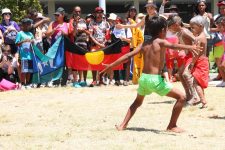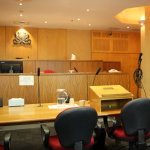Should there be Special Courts for Indigenous Children?

The over-representation of Aboriginal and Torres Straight Islander people in the criminal justice system is something that is frequently commented on, with an adult incarceration rate of almost 12 times the rest of the Australian population.
Many of the measures that have so far been put into place to try to reduce this over-representation have focused on adults, but a new program to be set up in western Sydney will look at young people.
The NSW Government recently announced the trial of a special children’s court at Parramatta, which will be set up exclusively to deal with young Aboriginal and Torres Strait Islander people who have come into contact with the criminal justice system.
The stated aim of this court is to help remedy some of the early issues that can lead to these young people falling into lifelong patterns of criminal behaviour, and provide them with the help and support they need to help break the cycle of crime.
Why should indigenous youth have different courts?
There are a number of reasons behind the idea of having a separate court to deal with indigenous youth.
Young indigenous people often face social issues which are unique and very different to those faced by youth from other backgrounds.
Their family and cultural backgrounds may be a factor in their behaviour, and it is believed by many that specific courts which are set up with these factors in mind could be more effective at dealing with these complex issues than the mainstream children’s courts.
Some of the issues that young indigenous people can face include social isolation and lack of support networks, high levels of drug and alcohol dependence, and lack of education.
This can make them more vulnerable and more likely to end up as perpetrators of crime.
Courts which work with indigenous elders may be able to provide targeted support and advice to help young people deal with the issues that might have contributed to them appearing in court in the first place.
Potentially, this could help reduce the rates of Aboriginal and Torres Strait Islander inmates in prisons, and help young people stay away from the criminal justice system in the future.
How will the indigenous court work?
The proposed Koori children’s court will work by allowing elders to be present and advise the magistrate, although they won’t have any input into the final sentence.
Although different to the circle sentencing courts which have been implemented for adults in some places, the defendant will sit around a table with elders, lawyers and the magistrate, and will have a say in the outcome.
Like regular children’s courts, detention will be considered a last resort, as the court will focus on developing a plan to help the young person overcome any issues that might have contributed to them being in trouble, and hopefully give them a chance to get their lives on a more positive path.
As well as this, the courts will be laid out more informally than other children’s courts, with an emphasis on speaking plain English with a minimum of legal jargon.
The courts will work with indigenous youth who have been found guilty of a crime at Parramatta Children’s Court, and develop a strategy to help them improve their cultural and social connections, help them with any alcohol or substance abuse issues, and encourage them to participate in work or study.
A pre-sentencing option
The Koori court will be a pre-sentencing option.
The young people who go through this court will then have six months before sentencing to comply with the plan.
If they breach the conditions of their plan, they could be sent back to the regular children’s court for sentencing.
The new court will also feature opportunities for young people who are guilty of offences to learn more about the impact of their actions on others, with people who were impacted by their behaviour allowed to attend the court and read out a statement if they choose to do so.
Under the current system, there is a massive over-representation of young indigenous people in custody, with around 60% of those in juvenile detention being from an Aboriginal or Torres Strait Islander background.
Putting young people in custody doesn’t work to remedy the issues that may have led to them committing a crime in the first place, and can just serve to isolate them further in the community when they are released.
The Koori Court is due to start up in January 2015, and will run for a year on a trial basis before further evaluation.
If it is successful, it is anticipated that more of these specialist children’s courts may be set up in future, giving young indigenous people across Sydney and NSW access to extra support and culturally appropriate sentencing in the future.






